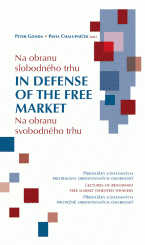 |
|||||||
| INSTITUTE | CONSERVATISM | M.R.STEFANIK |
| NEWS
|
[26.02.2007, The Slovak Spectator, NEWS]
Institute analyst Peter Gonda said that even if Slovakia fulfills the five Maastricht criteria for entry to the euro-zone - the criteria set debt, inflation, interest rate and budget deficit caps - it still cannot be said to be ready for euro adoption. According to Gonda, the Maastricht criteria give protection to existing euro-zone members who do not want to accept a country that could threaten their financial stability. They say nothing about whether a country is prepared to adopt the euro or about the functionality of the euro-zone itself. The ©tefánik Institute therefore suggests that an additional seven criteria should be considered that would reflect the potential benefits of euro-zone membership for a country. According to Gonda, Slovakia's entry to the euro-zone could be risky with regards to the unreformed old-age pension schemes of older EU members. Moreover, membership in the EU monetary union does not create conditions for Slovakia's higher economic growth, Gonda said. The Institute is also concerned about the ongoing efforts of large EU member states to achieve harmonization in various areas including tax and welfare systems, which could restrict Slovakia's competitiveness. Gonda concluded that Slovakia could profit only from the lower transaction costs resulting from entry into the euro-zone. From press reports. Published in the Slovakia`s English-language weekly The Slovak Spectator. |
 English | Slovak
English | Slovak
This website was created also thanks to funding granted by The Trust
for Civil Society in Central and Eastern Europe.
Website powered by Metafox CMS from Platon Group.
|
Conservative Institute of M. R. Stefanik |
Tel.:
+421 258 100 188 |

 The M. R. ©tefánik Conservative Institute says that Slovakia's adoption of the euro under current conditions could bring more disadvantages than advantages to the country.
The M. R. ©tefánik Conservative Institute says that Slovakia's adoption of the euro under current conditions could bring more disadvantages than advantages to the country.





